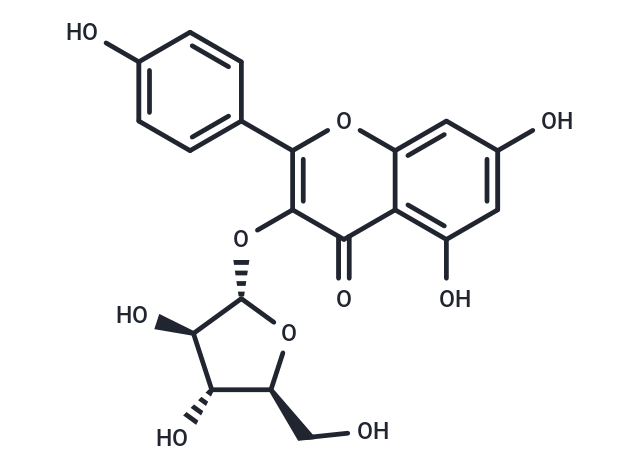Shopping Cart
Remove All Your shopping cart is currently empty
Your shopping cart is currently empty
Juglanin is a JNK activator. Juglanin with inflammation and anti-tumor activities. It can induce apoptosis and autophagy on human breast cancer cells.

| Pack Size | Price | USA Warehouse | Global Warehouse | Quantity |
|---|---|---|---|---|
| 1 mg | $96 | In Stock | In Stock | |
| 5 mg | $239 | In Stock | In Stock | |
| 10 mg | $383 | In Stock | In Stock | |
| 25 mg | $629 | In Stock | In Stock | |
| 50 mg | $912 | In Stock | In Stock |
| Description | Juglanin is a JNK activator. Juglanin with inflammation and anti-tumor activities. It can induce apoptosis and autophagy on human breast cancer cells. |
| In vitro | Juglanin inhibits the proliferation of breast cancer cells in a dose- and time-dependent manner and presents less cytotoxic against the normal cells. Juglanin results in the accumulation of cancer cells in the G2/M phase and a corresponding decrease in G0/G1 and S phases in both MCF-7 and SKBR3 cells. Juglanin up-regulates the expressions of phosphorylated Chk2, Chk2, phosphorylated Cdc25C, phosphorylated Cdc2, p27, cyclin D and down-regulates the levels of Cdc25C as well as Cdc2. The proportion of apoptosis is negligible for control cells, whereas 24 h of exposure of cells to Juglanin leads to a dose-dependent increase of apoptotic cells in both MCF-7 and SKBR3 cells. Juglanin significantly suppresses the anti-apoptotic factor of Bcl-2 expression, and in contrast Bad and Bax are both up-regulated for Juglanin treatment. Juglanin markedly activates caspases and leads to Caspase-9, Caspase-8, and Caspase-3 cleavage. ROS generation is initiated by Juglanin and significantly increased by high concentrations of Juglanin. Juglanin also increases the level of JNK phosphorylation in both MCF-7 and SKBR3 cells. |
| Cell Research | Breast cancer cells are plated in 96-well plates with a density of 5×10^3 cells/well. After 12 h, the cells are treated with different concentrations of Juglanin (0 to 40 μM) for different periods of time (24 h and 48 h). Then the fresh mixture of MTS and PMS is added and incubated for 4 h at 37°C according to the manufacturer's protocol. A microplate reader is conducted to determine the absorbance at 500 nm, and the IC50 values are assessed with the probit model. Each one is performed in triplicate. |
| Animal Research | Male BALB/c-nude mice, aged 5 weeks, are used. They are maintained under specific pathogen-free conditions and supplied with sterilized food and water. On day 0, about 5×10^6 MCF-7 cells suspended in 0.1 mL PBS are inoculated subcutaneously in the right flank of each mouse (six mice each group). On day 9, when the tumors reach palpable size of around 200 mm3, mice are randomly assigned to three groups and receive daily intraperitoneal injection with 100 μL of vehicle (10% DMSO, 70% Cremophor/ethanol (3: 1), and 20% PBS), and 5 or 10 Juglanin mg/kg of celastrol. Tumor sizes are measured daily to observe dynamic changes in tumor growth. Body weights are also measured daily. After 7 days of drug administration, when the tumors of the control group reach around 1600 mm3, all mice are killed. Tumors are dissected and stored in liquid nitrogen or fixed in formalin for further analysis. |
| Molecular Weight | 418.35 |
| Formula | C20H18O10 |
| Cas No. | 5041-67-8 |
| Smiles | OC[C@@H]1O[C@@H](Oc2c(oc3cc(O)cc(O)c3c2=O)-c2ccc(O)cc2)[C@H](O)[C@H]1O |
| Relative Density. | 1.76 g/cm3 (Predicted) |
| Storage | store at low temperature,keep away from moisture,keep away from direct sunlight | Powder: -20°C for 3 years | In solvent: -80°C for 1 year | Shipping with blue ice/Shipping at ambient temperature. | |||||||||||||||||||||||||
| Solubility Information | DMSO: 20 mg/mL (47.81 mM), Sonication is recommended. Methanol: 16 mg/mL (38.25 mM), Sonication is recommended. | |||||||||||||||||||||||||
| In Vivo Formulation | 10% DMSO+40% PEG300+5% Tween 80+45% Saline: 2 mg/mL (4.78 mM), Sonication is recommended. Please add the solvents sequentially, clarifying the solution as much as possible before adding the next one. Dissolve by heating and/or sonication if necessary. Working solution is recommended to be prepared and used immediately. The formulation provided above is for reference purposes only. In vivo formulations may vary and should be modified based on specific experimental conditions. | |||||||||||||||||||||||||
Solution Preparation Table | ||||||||||||||||||||||||||
Methanol/DMSO
| ||||||||||||||||||||||||||
| Size | Quantity | Unit Price | Amount | Operation |
|---|

Copyright © 2015-2026 TargetMol Chemicals Inc. All Rights Reserved.